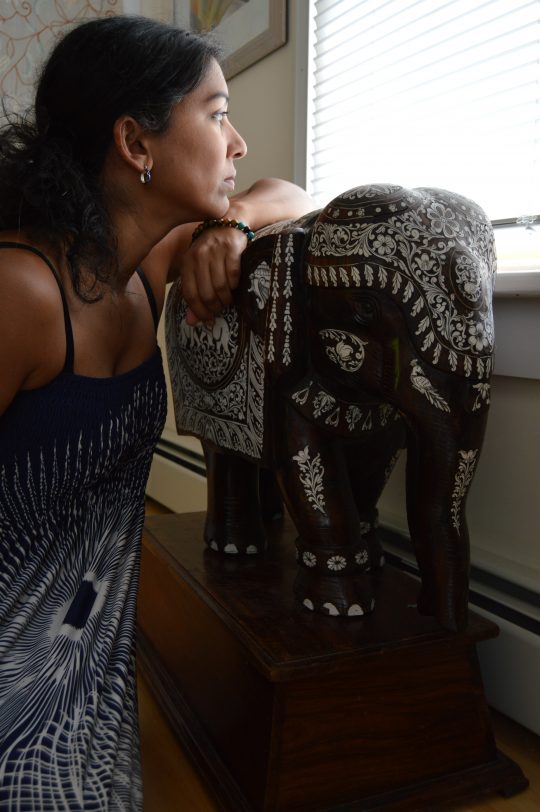.
A centuries-old encomium to romantic love and longing, Kuruntokai is one of the classical anthologies of love poetry from the Cankam era of Tamil, South Indian literature. Written in a formal style involving a first-person monologue by any of a number of characters in a love drama, these poems reconstitute the field of human emotion by plunging it deep into its source in the cycles of landscapes, seasons, times of day. The characters are represented as anonymous and archetypal (talaivi is the heroine, and talaivan the hero), but no reader experiencing these poems full of detail and fine nuance avoids getting turned inside out. For a beautiful exploration of the history of this genre of poetry (called akam) and the central role of poetics in South Indian culture, refer to the recent book by David Shulman, Tamil: A Biography (Belknap/Harvard, 2016).
.
Poem of the desert road
Talaivi says—
As though a sliver of sacred conch shell
in the reddened sky, there it is,
the slim moon, risen again.
Could he ever forget me and my tears?
Striding in that wide wasteland
he’s just like a bull elephant
that for his limping mate splits a tall yā tree,
stabbing it with his tusks to take the white bark,
which wounds him with its dry taste. He swallows
then thunders to the outer bounds of what the heart can bear.
Katampanūr Cāntiliyanār
Kuruntokai, verse 307
.
Poem from the jasmine-filled forest
Talaivi says—
Under the spiraling horns of our dark buffalo,
the grinning bell on the rope tied to her thick neck
peals each time she moves in the dead of the night.
He hasn’t returned.
Massive black boulders forget what it is to be washed by rain
and stand waiting like dust-covered elephants,
where hills beyond hills curve the path he took.
He doesn’t think of my yearning shoulders and bamboo-like arms at all.
Maturai Marutan Ilanākanār
Kuruntokai, verse 279
.
Poem amid avenues lined with ornamental trees
Talaivi says—
We live in the same city, but he avoids my street.
When he does come down my street, he doesn’t step in to visit,
and as though he’s strolling past some strangers’ cremation grounds,
he takes an eyeful and keeps walking,
as though he’s not the one who has driven me out of my shyness
and my mind. Such love, like an arrow shot from a bowstring,
soars for only a moment and then falls someplace irretrievable, far away.
Pālai Pātiya Perunkatunkō
Kuruntokai, verse 231
.
Poem of the cool, purple-flowered hillsides
Talaivi’s friend says—
She’s got stomach to flirt and risk without hesitation.
Who’s to judge if he’s a gem or a good-for-nothing?
Her dance teacher says she’s got the clearest head,
but the day that she set her eyes on the dark pond
covered in green and a profusion of tight, bursting buds,
she coveted the long petals of the blue lotus inside.
Now, her fiery eyes choose heartache
and she’s set her jaw, resolute.
Pēricattanār
Kuruntokai, verse 366
.
Poem of the mountainside wildflowers
Talaivan says—
On charred and newly sown land, the rhythmic beat of the cane in my girl’s hand
entranced a pandemonium of parrots, which lay down
seduced by her waving and her cries: the music of music.
Those parrots, mistaking her menacing for a greeting, wouldn’t fly off,
and I saw her furious eyes flood like a pair of mountain spring waterlilies
shot with heavy rain droplets and dotted in a lush flight of beetles.
She is the poem that has drowned my soul to its last drenched flower.
Kapilar
Kuruntokai, verse 291
.
Poem from the blue lotus seashore
Talaivi says—
Flowers from morning glory beach vines and waterlilies,
plaited into long garlands, drenched our tresses there
as slick crabs fled from me and my friends
and into the sea. Just one day’s
raucous games with that god of the shore has bitten off
our entwining friendship. Strange what a dearth desire makes.
Ammuvanār
Kuruntokai, verse 401
—Translation by A. Anupama
Resources: Vaidehi Herbert’s translations at learnsangamtamil.com and Robert Butler’s translations. I owe much gratitude to T. Kabilan for material assistance with this set of poems.
.
A. Anupama is a U.S.-born, Indian-American poet and translator whose work has appeared in several literary publications, including Drunken Boat, Waxwing, Monkeybicycle, and Fourteen Hills. She received her MFA in writing from Vermont College of Fine Arts in 2012. She currently lives and writes in the Hudson River valley of New York, where she organizes literary community (RiverRiver.org), and blogs about poetic inspiration at seranam.com.
.
.

Beautiful poetry. Liked the one by Kapilan. Descriptions are clearly from another age.